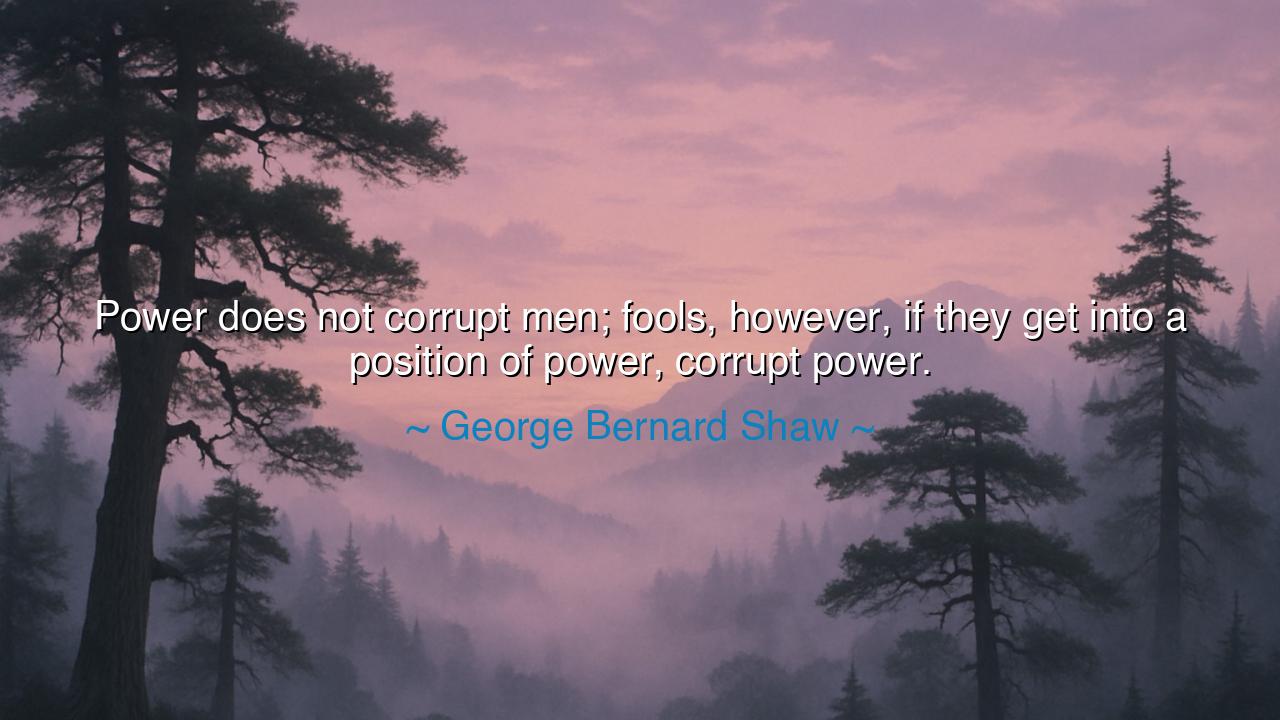
Power does not corrupt men; fools, however, if they get into a
Power does not corrupt men; fools, however, if they get into a position of power, corrupt power.






Hear, O children of wisdom, the words of George Bernard Shaw, a man whose keen understanding of human nature and the dynamics of power resonates across time. He said, "Power does not corrupt men; fools, however, if they get into a position of power, corrupt power." These words strike at the very heart of the nature of authority—not that power itself is inherently evil, but that the character of those who wield it can turn it into a tool of corruption. In Shaw's wisdom, we are reminded that power—like a blade—can be used for both good and evil, but it is the hands that wield it that determine its fate.
Consider, O wise ones, the nature of power. It is often believed that those who hold power are corrupted by it, that authority itself leads to the darkness of greed and oppression. But Shaw reveals a deeper truth: it is not the power that corrupts, but the foolishness of those who are unworthy of it. Power, in its purest form, is simply the ability to affect change, to lead, to guide. It can be a force for good, a means to elevate others and bring about justice. But when placed in the hands of fools—those who lack wisdom, self-awareness, and integrity—that same power becomes twisted, distorted, and used to oppress, manipulate, and destroy.
In the ancient world, O children, the wise rulers understood the nature of power and how it must be tempered with wisdom. Solomon, the ancient king of Israel, was known for his great wisdom, and it was this wisdom that allowed him to wield his power justly. When faced with difficult decisions, he sought counsel and divine guidance before acting. He knew that power alone could easily lead to corruption if not handled with humility and foresight. Solomon’s reign was marked by prosperity and peace because he recognized that true power comes not from domination, but from wise and compassionate leadership. His story serves as a powerful reminder that wisdom is the key that unlocks the potential of power for good.
Contrast this, O children, with the story of Nero, the Roman emperor whose reign is remembered not for justice or prosperity, but for cruelty and madness. Nero came into power with the potential to lead an empire to greatness, yet his reign was marked by extravagance, tyranny, and persecution. He used his power not for the welfare of his people but for his own selfish desires. Nero’s actions demonstrate the truth in Shaw's words—it was not the power itself that corrupted him, but his own foolishness, his insecurity, and his inability to see beyond his own ego. He became a fool in power, and in turn, he corrupted the very power that could have brought prosperity to the Roman Empire.
In our own time, O children, we see similar examples of how foolishness in power leads to corruption. Think of the leaders who, instead of using their positions to serve others, use them for personal gain, for control, or for manipulation. Whether in politics, business, or any field where power is wielded, it is often the foolishness of those in charge that causes the greatest harm. History has shown us that wise leadership leads to progress, while foolish leadership leads to division, oppression, and suffering. Shaw’s insight urges us to recognize that it is not the mere possession of power that leads to harm, but the lack of wisdom in its use.
So, O children, the lesson is clear: power itself is not inherently corrupt, but it is the character of those who wield it that determines its effects. Shaw’s wisdom teaches us that to truly lead, one must first cultivate wisdom, humility, and a deep understanding of the responsibilities that come with power. Power can be a force for good, but it must be guided by a leader who seeks not personal gain but the well-being of all. It is not enough to desire power; we must strive to be worthy of it, to approach it with the understanding that it is a tool to be used for justice, for upliftment, and for the common good.
As you walk through life, O children, remember that power can be a force for good or evil, depending on the hands that hold it. Seek not to acquire power for its own sake, but seek the wisdom to know how to wield it with integrity, humility, and compassion. Just as Solomon wielded power with wisdom, so too must you understand that the true test of a leader lies not in how much power they command, but in how they use it to shape a world of justice, peace, and goodwill. Let your actions be guided by wisdom, and may the power you hold serve not your ego, but the higher good of all those you are called to lead.






AAdministratorAdministrator
Welcome, honored guests. Please leave a comment, we will respond soon